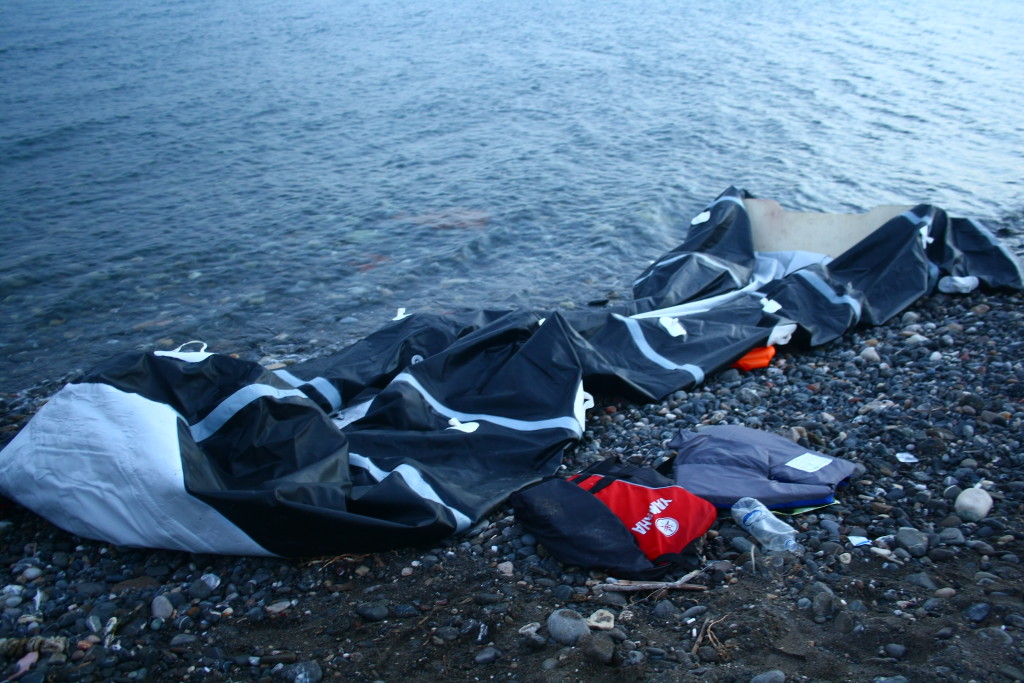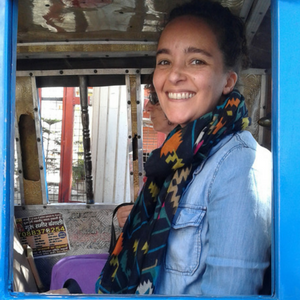 Deflated refugee boat and abandoned life jackets on a Kos beach. Photo by Kimberlyn David.
Deflated refugee boat and abandoned life jackets on a Kos beach. Photo by Kimberlyn David.
If you’ve regularly been following news about asylum-seeking refugees, you’ve likely heard about the Greek island Kos, a major passageway into Europe for people fleeing war-ravaged places like Syria and Afghanistan.
I’ve just spent a week in Kos—my partner is producing refugee stories for a Dutch public broadcaster (we parted ways in Kos; he’s now on the last leg of following an Iraqi woman we met in Kos from Greece to Western Europe. He told me it was incredible to see the outburst of triumph and pride among refugees as they reached the Austria-Germany border. “They said they feel free, and it’s amazing to watch that change come over them.”). He invited me to join him in Kos, so I followed in his journalistic shoes, speaking with refugees, border agents, and local residents.
I took the above picture on my second morning there. This rubber boat carried 40–50 people, and it landed on the beach a few feet from where I stood. The refugees had paid smugglers to get them from Bodrum, Turkey, and they were lucky their dinghy hadn’t capsized—these boats aren’t meant to carry so many people; choppy waters and wind are life-threatening hazards.
While in Kos, I was on the lookout for perspectives and stories not being discussed much, or at all, in the major media. I wondered: What might we learn about the consequences of war when we open ourselves to those who are fleeing it? What could these people teach us about courage, creative resilience, and tolerance? Could we, through dialogue and shared vulnerability, find some clues to lasting peace—to love? (Since I’ve pitched a magazine with a journalistic essay about these questions and my interactions in Kos, I won’t fully go into them here.)
We often hear about problems and solutions through the voices of policymakers and celebrities, most of whom have no lived experience with the issues at hand. Which of course presents a skewed understanding of who gets to participate in public discourse and how change is made.
I’m currently in The Netherlands, where, like everywhere else in Europe, there’s a mixed response to “the refugee crisis.” Many people have enthusiastically volunteered to serve refugees, but many others fear cultural clashes or having to sacrifice their lifestyles. And the news media largely play up to this split. But what about the in-between? There’s a middle road worth exploring.
I believe that when human beings with vastly different perspectives share time and space together, life-changing transformations occur—hearts crack open, fears are eliminated (for a fantastic example of this at work, see Morgan Spurlock’s “30 Days: Immigration,” which portrays the heart-mind changes a Minuteman undergoes after living with undocumented Latinos in Los Angeles for a month). As a yoga teacher, I’ve seen our tendency to stereotype or avoid others melt away when we roll out our mats together. It’s a beautiful feeling to completely forget that any so-called division existed to begin with.
What could be healed within politicians’ hearts, then, if Syrian children addressed an audience comprising members of Congress and CEOs of weapons corporations about the problem of profiting from war? What might change about their lawmaking and lobbying as a result? Would the United Nations pursue a different tack if they visited Syrian refugee camps like Yarmouk, as Angelina Jolie has suggested? Perhaps, after meeting the human lives devastated by war, the Security Council would live up to its word and introduce a no-fly zone, as the White Helmets have been urging the UN to do in Syria (want to help with that? Sign the White Helmets’ petition).
There’s a tendency to lump refugees into a single mass, but they’re of course diverse peoples with a diverse range of life experiences and talents. They are the real experts on war since they’ve lived through it, and so they are a reliable source of creative possibilities to peace building. We should listen to their stories of strife with hearts wide open, and we must also invite them to participate in forging pathways to conflict resolution and developing just forms of power-sharing.
Other posts on this topic:
Maja, a member of our board, wrote about her experiences with grassroots efforts in Sweden to assist refugees. Her post, “Eruption of Human Goodness,” is a touching and personal account.
You may also be interested in Stephanie Van Hook and Tord Dellsén’s “Take Heart and Take Action—to End War,” in which they curated some of the most hopeful stories about European citizens supporting refugees.








